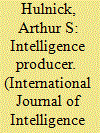| Srl | Item |
| 1 |
ID:
049612


|
|
|
|
|
| Publication |
Westport, Praeger Publishers, 1999.
|
| Description |
xxi, 222p.
|
| Standard Number |
0275966534
|
|
|
|
|
|
|
|
|
|
|
|
Copies: C:1/I:0,R:0,Q:0
Circulation
| Accession# | Call# | Current Location | Status | Policy | Location |
| 043425 | 327.1273/HUL 043425 | Main | On Shelf | General | |
|
|
|
|
| 2 |
ID:
091229


|
|
|
|
|
| Publication |
2009.
|
| Summary/Abstract |
Americans have always been ambivalent about internal security and homland defense. In times of crisis, they are willing to give up some measure of privacy and accept the erosion of normal liberties in the interest of collective security.
|
|
|
|
|
|
|
|
|
|
|
|
|
|
|
|
| 3 |
ID:
107251


|
|
|
| 4 |
ID:
084733


|
|
|
| 5 |
ID:
076353


|
|
|
|
|
| Publication |
2006.
|
| Summary/Abstract |
In the modern era, almost all intelligence professionals will study the Intelligence Cycle as a kind of gospel of how intelligence functions. Yet it is not a particularly good model, since the cyclical pattern does not describe what really happens. Policy officials rarely give collection guidance. Collection and analysis, which are supposed to work in tandem, in fact work more properly in parallel. Finally, the idea that decision makers wait for the delivery of intelligence before making policy decisions is equally incorrect. In the modern era, policy officials seem to want intelligence to support policy rather than to inform it. The Intelligence Cycle also fails to consider either counter-intelligence or covert action. Taken as a whole, the cycle concept is a flawed model, but nevertheless continues to be taught in the US and around the world.
|
|
|
|
|
|
|
|
|
|
|
|
|
|
|
|